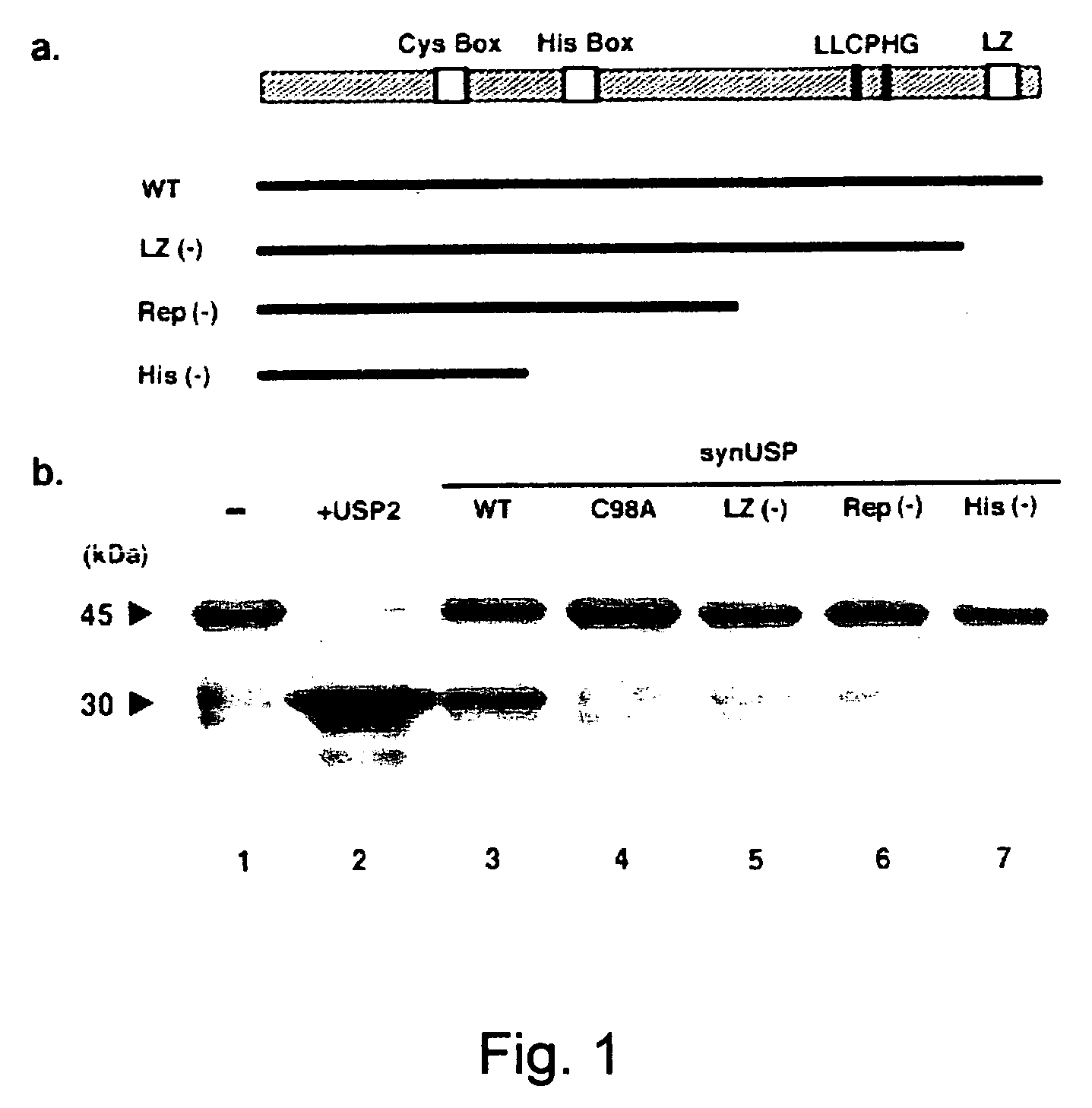Ubiquitin-specific protease occurring in the brain and dna encoding the same
a technology of ubiquitin-specific protease and brain, which is applied in the field of ubiquitin-specific protease occurring in the brain and a dna encoding the same, can solve the problems of many unknown functions
- Summary
- Abstract
- Description
- Claims
- Application Information
AI Technical Summary
Benefits of technology
Problems solved by technology
Method used
Image
Examples
example 1
Cloning of Full Length Dem 21 cDNA
[0049] The Dem 21 double-stranded cDNA (length: 215 bp) was obtained as reported in Mol. Brain Res. 72:147-157, 1999. The obtained cDNA was labeled with digoxigenin (DIG) by the PCR labeling method to obtain a DIG-labeled Dem 21 cDNA probe.
[0050] In screening libraries prepared from unstimulated rat brains by using this probe, any positive clone was not obtained. Therefore, an oligo-(dT) primed cDNA library prepared from a hippocampus harvested 4 hours after high-frequency stimulation was screened.
[0051] The oligo-(dT) primed cDNA library prepared from hippocampus harvested 4 hours after high-frequency stimulation in rats pretreated with cyclohexamide (Neuron, 14:433-455, 1995) was kindly provided by Dr. Yamagata of Tokyo Metropolitan Institute for Neuroscience. This library was plated at a density of 5×104 plaques per 150-mm plate, and filters (membranes) on which the plates were duplicated were screened by hybridization to the DIG-labeled Dem 2...
example 2
Confirmation of USP Activity of Expression Product
[0056] The activity of synUSP for digesting a model ubiquitinated protein was investigated by using a co-expression system of E. coli.
[0057] The USP activity was measured basically following the method of Everett et al. (EMBO J., 16:1519-1530, 1997) by using a T7-driven IPTG-inducible synUSP expression plasmid. The pT7-synUSP plasmid was prepared by inserting the complete coding region of synUSP into the NcoI site of T7 expression plasmid pET3d (pBR322 Ampr replicon). pACT7-synUSP which is a plasmid containing a T7-synUSP expression cassette in pACYC184 Cmr replicon was constructed by inserting an EcoRV fragment of pT7-synUSP at the EcoRV site of pACYC184. A plasmid pACYC-UBP (PACYC184 Cmr replicon) encoding yeast UBP2 and a plasmid pGEX-Ub52 (pBR322 Ampr replicon) encoding a GST-Ub52 fusion protein were used as positive controls for USP and a USP substrate. For cleavage of the GST-Ub52 substrate, cells of the E. coli strain BL21 (...
example 3
Preparation of Antibody, Subcellular Distribution and Tissue Distribution of synUSP
[0059] A peptide (C-15 peptide) consisting of 15 amino acid residues of the C-terminus of synUSP (amino acid numbers 1022 to 1036 in the amino acid sequence of SEQ ID NO: 2) was coupled to keyhole limpet hemocyanin and used to immunize a rabbit. After repeating booster immunization, blood serum was collected and anti-synUSP antibodies (C-15 Ab) were purified by affinity chromatography using Affi-Gel 10 on which the C-15 peptide was immobilized.
[0060] Specificity of the purified C-15 Ab was examined by performing Western blotting to the full length synUSP expressed in Cos7 cells according to the method described in J. Biol. Chem., 276, 21417-21424 (2001). As a result, C-15 Ab specifically reacted with the expressed synUSP of 125 kDa, and this interaction was blocked by addition of an excessive amount of the C-15 peptide.
[0061] The subcellular distribution of synUSP was investigated by using C-15 Ab....
PUM
| Property | Measurement | Unit |
|---|---|---|
| temperature | aaaaa | aaaaa |
| temperature | aaaaa | aaaaa |
| temperature | aaaaa | aaaaa |
Abstract
Description
Claims
Application Information
 Login to View More
Login to View More - R&D
- Intellectual Property
- Life Sciences
- Materials
- Tech Scout
- Unparalleled Data Quality
- Higher Quality Content
- 60% Fewer Hallucinations
Browse by: Latest US Patents, China's latest patents, Technical Efficacy Thesaurus, Application Domain, Technology Topic, Popular Technical Reports.
© 2025 PatSnap. All rights reserved.Legal|Privacy policy|Modern Slavery Act Transparency Statement|Sitemap|About US| Contact US: help@patsnap.com

